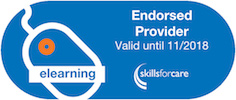Food Safety and Hygiene Supervision Level 3 (VTQ)
Food Safety Level 3
Food Safety and Hygiene Supervision Level 3 (VTQ) at a glance
- 3-year nationally recognised certificate
- 6 hours and 48 minutes of engaging video training
- Video access for 8 months
- Printable wall certificate
- CPD time credit conformation
- Free weekly video refresher
- Evidence Based Training certificate
- 100% online or add a skill session with one of our national evaluators
Our Food Hygiene Level 3 course is available as an online e-learning option through our partner dashboard or as an interactive classroom session. It is designed to meet the requirements of various regulations in food preparation, HACCP, and health and safety. This Level 3 course offers advanced training for those needing a more comprehensive understanding of food safety.
The course covers essential topics such as food hygiene legislation, the role of the Environmental Health Officer, and the implementation of HACCP principles. Participants will gain in-depth knowledge about bacteriology, food poisoning, cross-contamination prevention, and personal hygiene standards. The curriculum also includes practical guidance on food storage and preservation, pest control, and effective use of "use by" and "best before" dates for stock control.
Ideal for managers, supervisors, and senior staff in food-related industries, this course ensures that participants are well-equipped to maintain high standards of food safety and hygiene. Successful completion of the course will provide a solid foundation for those looking to advance their careers in food safety and meet the stringent requirements of food safety regulations.
The content of this and all our courses has been independently certified as conforming to universally accepted Continuous Professional Development (CPD) guidelines and come with a Certified CPD Statement as well as a ProTrainings Certificate and for online courses an Evidence Based Learning statement.
- Food supervisor
- Food manager
- Production manager
- Chefs
- Manufacture of food
- Catering
- Kitchens
- Hospital and care workers
- Hotels and restaurants
This course comes with 7.0 hrs (18.0 class) of CPD, although the time to complete the course online may be less than this. Total course time includes 6 hours and 48 minutes of video training as well as knowledge reviews, final test, remedial help and reviewing downloaded material.
The content of this and all our courses has been independently certified as conforming to universally accepted Continuous Professional Development (CPD) guidelines and come with a Certified CPD Statement as well as a ProTrainings Certificate and for online courses an Evidence Based Learning statement.
- Understand Food Hygiene Legislation and relevant regulations.
- Explain the Food Allergens Regulations 2014.
- Identify the role and responsibilities of the Environmental Health Officer.
- Implement HACCP principles in food handling and preparation.
- Conduct training for food handling personnel.
- Interpret Food Hygiene ratings.
- Describe bacteriology and the causes of food poisoning.
- Explain what bacteria are, how they grow, and how they affect us.
- Apply methods to control bacterial growth.
- Recognise the symptoms and effects of food poisoning.
- Distinguish between different types of infections.
- Identify the risks posed by chemicals and foreign objects in food.
- Understand natural plant foods and allergies.
- Recognise the hazards of chemicals near food.
- Implement safety measures to prevent Listeria and Campylobacter contamination.
- Understand food contamination and cross-contamination.
- Identify the danger zone and ways to prevent cross-contamination.
- Use chopping board colors to prevent contamination.
- Identify high-risk foods.
- Implement effective pest and fly control measures.
- Properly use hot food display units.
- Apply food safety practices when working at a bar or serving in a restaurant.
- Maintain personal hygiene, including hand washing and the use of hand gels.
- Use protective clothing effectively.
- Report illnesses and understand the importance of doing so.
- Equip and use First Aid Kits for food preparation.
- Understand appropriate workplace behavior and responsibilities.
- Recognise the importance of personal illness and exclusion from work.
- Understand food storage and preservation techniques.
- Comply with food area requirements.
- Follow rules to keep water supply safe.
- Apply proper heating and refrigeration practices.
- Understand refrigeration and freezing processes.
- Address dietary requirements, including gluten-free foods and Coeliac disease precautions.
- Implement egg precautions.
- Utilise "use by" and "best before" dates for effective stock control









